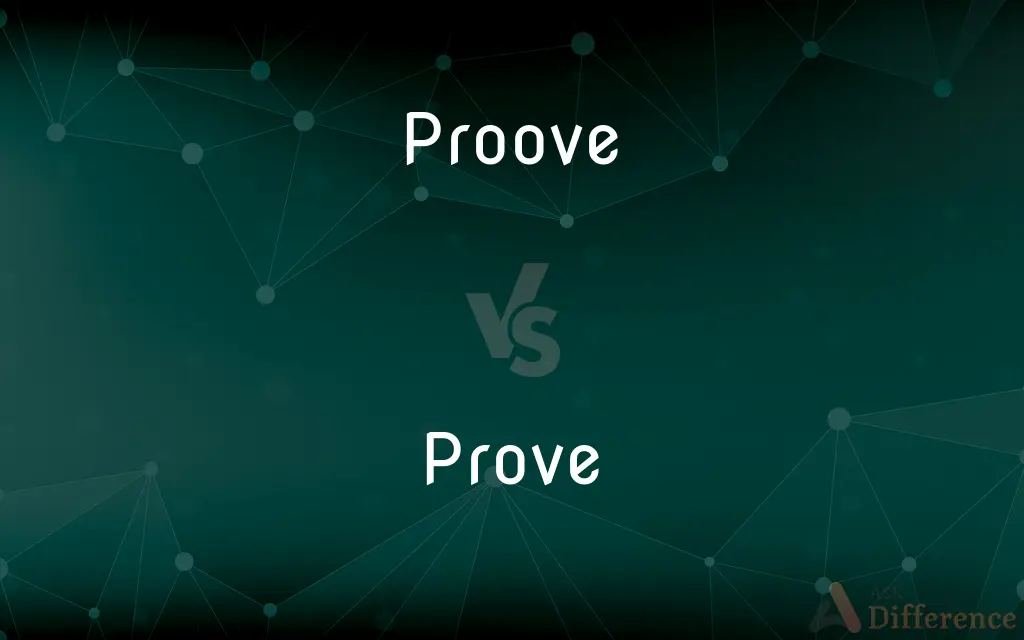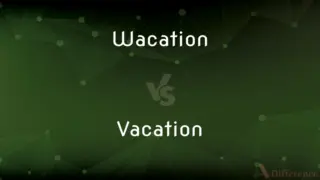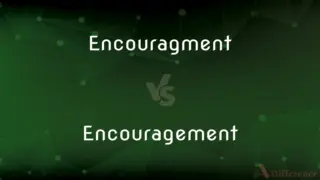Proove vs. Prove — Which is Correct Spelling?
By Tayyaba Rehman — Updated on March 18, 2024
"Proove" is an incorrect spelling, while "Prove" is the correct spelling denoting the act of demonstrating the truth or existence of something.

Table of Contents
Which is correct: Proove or Prove
How to spell Prove?

Proove
Incorrect Spelling

Prove
Correct Spelling
ADVERTISEMENT
Key Differences
Visualize a checkmark proving something right; it's straightforward and doesn't curve twice like two "o's."
Think of the word "move," which is spelled correctly without the extra "o."
"Love" proves a point with one "o," so should "Prove."
Only one "o" is needed to show something's truth; hence, "Prove."
The word "Pro" in "Prove" is like a professional getting straight to the point without adding unnecessary letters.
ADVERTISEMENT
How Do You Spell Prove Correctly?
Incorrect: He needed to proove himself to the team.
Correct: He needed to prove himself to the team.
Incorrect: The scientist attempted to proove his theory with experiments.
Correct: The scientist attempted to prove his theory with experiments.
Incorrect: She tried to proove her point with facts and statistics.
Correct: She tried to prove her point with facts and statistics.
Incorrect: It's hard to proove love with just words.
Correct: It's hard to prove love with just words.
Incorrect: Can you proove that you were at home last night?
Correct: Can you prove that you were at home last night?
Prove Definitions
To establish the truth or validity of something.
She was able to prove her alibi.
To demonstrate one's abilities or qualities.
This is your chance to prove yourself.
To determine the quality or genuineness of a substance.
The test will prove the gold's purity.
To subject to a test.
The theory was difficult to prove.
To turn out to be.
The trip proved a success.
To establish the truth or validity of (something) by the presentation of argument or evidence
The novel proves that the essayist can write in more than one genre. The storm proved him to be wrong in his prediction.
To demonstrate the reality of (something)
He proved his strength by doing 50 pushups.
To show (oneself) to be what is specified or to have a certain characteristic
Proved herself to be a formidable debater.
Proved herself to be worthy of the task.
To establish by the required amount of evidence
Proved his case in court.
To establish the authenticity of (a will).
To demonstrate the validity of (a hypothesis or proposition).
To verify (the result of a calculation).
To subject (a gun, for instance) to a test.
(Printing) To make a sample impression of (type); proof.
(Archaic) To find out or learn (something) through experience.
To be shown to be such; turn out
A theory that proved impractical in practice.
A schedule that proved to be too demanding.
(transitive) To demonstrate that something is true or viable; to give proof for.
I will prove that my method is more effective than yours.
(intransitive) To turn out; to manifest.
It proved to be a cold day.
(copulative) To turn out to be.
Have an exit strategy should your calculations prove incorrect.
(transitive) To put to the test, to make trial of.
They took the experimental car to the proving-grounds.
The exception proves the rule.
(transitive) To ascertain or establish the genuineness or validity of; to verify.
To prove a will
To experience.
To take a trial impression of; to take a proof of.
To prove a page
(homeopathy) To determine by experiment which effects a substance causes when ingested.
(baking) The process of dough proofing.
To try or to ascertain by an experiment, or by a test or standard; to test; as, to prove the strength of gunpowder or of ordnance; to prove the contents of a vessel by a standard measure.
Thou hast proved mine heart.
To evince, establish, or ascertain, as truth, reality, or fact, by argument, testimony, or other evidence.
They have inferred much from slender premises, and conjectured when they could not prove.
To ascertain or establish the genuineness or validity of; to verify; as, to prove a will.
To gain experience of the good or evil of; to know by trial; to experience; to suffer.
Where she, captived long, great woes did prove.
To test, evince, ascertain, or verify, as the correctness of any operation or result; thus, in subtraction, if the difference between two numbers, added to the lesser number, makes a sum equal to the greater, the correctness of the subtraction is proved.
To take a trial impression of; to take a proof of; as, to prove a page.
To make trial; to essay.
To be found by experience, trial, or result; to turn out to be; as, a medicine proves salutary; the report proves false.
So life a winter's morn may prove.
To succeed; to turn out as expected.
Be shown or be found to be;
She proved to be right
The medicine turned out to save her life
She turned up HIV positive
Establish the validity of something, as by an example, explanation or experiment;
The experiment demonstrated the instability of the compound
The mathematician showed the validity of the conjecture
Provide evidence for;
The blood test showed that he was the father
Her behavior testified to her incompetence
Prove formally; demonstrate by a mathematical, formal proof
Put to the test, as for its quality, or give experimental use to;
This approach has been tried with good results
Test this recipe
Increase in volume;
The dough rose slowly in the warm room
Cause to puff up with a leaven;
Unleavened bread
Take a trial impression of
Obtain probate of;
Prove a will
Prove Meaning in a Sentence
He could prove his location at the time of the incident with a receipt.
It's difficult to prove the existence of an unknown species.
The athlete aimed to prove her strength in the upcoming competition.
To prove his theory, the scientist conducted several experiments.
Witnesses came forward to prove the innocence of the accused.
The lawyer had enough evidence to prove his client's innocence.
She wanted to prove to her parents that she could be responsible.
They managed to prove the historical authenticity of the artifact.
To prove the solution correct, the mathematician presented a proof.
You don't need to prove anything to anyone but yourself.
Prove that you can handle this task, and you'll earn more responsibility.
The results of the study prove the effectiveness of the new medicine.
The software developer was able to prove that the bug had been fixed.
The student's project aimed to prove the benefits of renewable energy.
The detective gathered clues to prove the suspect's guilt.
The children tried to prove to their parents that they had seen a bear in the backyard.
The author sought to prove the impact of historical events on modern society.
The inventor hoped to prove that his creation could change the world.
He used a series of photos to prove how the event unfolded.
To prove her love, she wrote him a song from the heart.
He wanted to prove that hard work pays off more than talent.
She hoped the test results would prove her hypothesis wrong.
They needed to prove their loyalty to be accepted into the group.
In court, the prosecution must prove beyond a reasonable doubt.
She had to prove her ability to lead the team in a crisis.
Prove Idioms & Phrases
Prove oneself worthy
To demonstrate that one deserves respect, trust, or a particular status.
She worked day and night to prove herself worthy of the promotion.
Prove one's mettle
To show one's strength of character, especially in challenging situations.
The final exam was her chance to prove her mettle.
Prove a point
To demonstrate that one's opinion or assertion is correct.
He ate all the spicy food to prove a point about his tolerance.
Prove beyond a shadow of a doubt
To establish the truth of something so clearly that no doubt remains.
The evidence was so compelling that it proved his innocence beyond a shadow of a doubt.
Prove to be a challenge
To turn out to be difficult but potentially rewarding.
The new project proved to be a challenge for the entire team.
To prove wrong
To show that someone's opinion or belief is incorrect.
He was determined to prove the critics wrong with his next movie.
Prove a theory
To provide evidence or arguments that support a scientific idea or hypothesis.
The experiment was designed to prove a theory about chemical reactions.
Nothing to prove
To be confident in one's abilities or worth without the need to demonstrate them to others.
After years of success, she felt she had nothing to prove.
Prove your salt
To demonstrate one's abilities or worth, based on the old practice of paying soldiers in salt.
He proved his salt during the emergency, leading everyone to safety.
Common Curiosities
What is the pronunciation of Prove?
Prove is pronounced as /pru:v/.
Which vowel is used before Prove?
The vowel "o" is used before the "v" in "Prove."
Why is it called Prove?
The term "prove" comes from the Old French "prover" which means "to test" or "to prove."
What is the verb form of Prove?
"Prove" is already in its verb form.
What is the singular form of Prove?
"Prove" is in its singular form.
What is the plural form of Prove?
Verbs do not have plural forms. However, the noun form "proof" has a plural "proofs."
Is Prove an abstract noun?
No, the verb "prove" isn't an abstract noun. However, its related noun "proof" can be abstract in some contexts.
What is the root word of Prove?
The root word of "prove" is the Latin word "probare" meaning "to test."
Which conjunction is used with Prove?
Any conjunction can be used, depending on the sentence structure.
Is Prove a collective noun?
No, "prove" is not a collective noun.
Is the Prove term a metaphor?
Not inherently, but it can be used metaphorically.
Is Prove a noun or adjective?
"Prove" is primarily a verb.
Is Prove an adverb?
No, "prove" is not an adverb.
What is a stressed syllable in Prove?
The entire word "Prove" is stressed as it's one syllable.
Which preposition is used with Prove?
The preposition "to" is commonly used, as in "prove to someone."
Is Prove a vowel or consonant?
"Prove" is a word, not a single letter.
Is Prove a countable noun?
"Prove" is a verb; its related noun "proof" can be countable.
Is the word Prove is imperative?
It can be, as in "Prove it!"
What is the opposite of Prove?
Disprove.
What is the first form of Prove?
Prove.
Which article is used with Prove?
As a verb, "prove" doesn't need an article. However, "a" or "the" can precede its noun forms.
Is Prove a negative or positive word?
Neutral; its connotation depends on the context.
Is the word “Prove” a Direct object or an Indirect object?
"Prove" is a verb and cannot be a direct or indirect object.
What is another term for Prove?
Demonstrate.
What is the second form of Prove?
Proved.
How is Prove used in a sentence?
You need to prove your point with evidence.
Is the word Prove is Gerund?
No, its gerund form is "proving."
How many syllables are in Prove?
One syllable.
What part of speech is Prove?
Verb.
How do we divide Prove into syllables?
Prove is not divided as it's one syllable.
Which determiner is used with Prove?
Determiners like "this" or "that" can be used, depending on the context.
What is the third form of Prove?
Proven or Proved.
Share Your Discovery

Previous Comparison
Coz vs. Cuz
Next Comparison
Scenery vs. ScenaryAuthor Spotlight
Written by
Tayyaba RehmanTayyaba Rehman is a distinguished writer, currently serving as a primary contributor to askdifference.com. As a researcher in semantics and etymology, Tayyaba's passion for the complexity of languages and their distinctions has found a perfect home on the platform. Tayyaba delves into the intricacies of language, distinguishing between commonly confused words and phrases, thereby providing clarity for readers worldwide.













































